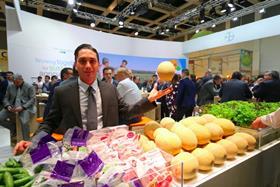
Bayer has used Fruit Logistica in Berlin to introduce several new vegetable seed varieties for the fresh produce supply chain.
A huge production trend, according to the group's vegetable seeds team, is hydroponic lettuce. These plants grow in a nutrient-rich water solution in a greenhouse and, at first glance, production is more expensive than growing in soil.
However, there are also many benefits. Producing in a greenhouse means that growers are not dependent on the weather, they get results sooner and can harvest more often. For consumers and processors, hydroponic lettuce is easier to handle because they do not have to wash the crop intensively, and consumers can buy a sustainably produced product that requires fewer crop protection products during the growing stage.
Bayer also presented a new coloured snack carrot design that contains four different colours and is based on different Nunhems Imperator varieties.
According to Bayer, each carrot has its own taste and different healthy components, while the growers benefit from their disease resistance. Compared to traditional carrots, they are crispier, sweeter and have a more attractive colour.
In addition the company showcased its recently launched Minigustos label, the world’s first brand for tasty, crunchy, and attractive snack vegetables. The first vegetables to be released under the Minigustos label will be snack cucumbers.
Food Chain Partnership
Bayer also showcased its Food Chain Partnership activities, with the company presenting a number of successful examples from various regions that link partners along the value chain enabling safety, quality, affordability, transparency and above all sustainability, from seed to shelf.
Bayer’s Food Chain Partnership initiative is based on delivering tailored integrated solutions that address the individual local challenges of growers and the supply chain.
'We don’t have ready-made solutions,' said Ronald Guendel, global head of food chain relations at the Crop Science division of Bayer. 'In all our projects, we check out the situation on site, talk to our partners to find out which needs they really have. With this understanding we then develop individual action plans and provide growers with the tools to meet those needs.'
The Food Chain Partnership initiative has grown over the past decade and become an 'indispensable link' between growers, traders, processors and retailers when it comes to improving sustainable practices for farmers and suppliers worldwide.
Currently about 70 Food Chain Managers from Bayer are active in 30 countries around the world and focus on more than 50 different crops.



